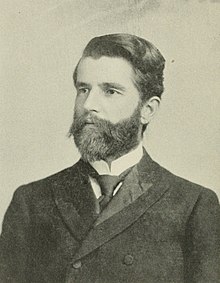Marion Butler | |
|---|---|
 | |
| United States Senator from North Carolina | |
| In office March 4, 1895 – March 4, 1901 | |
| Preceded by | Matt W. Ransom |
| Succeeded by | Furnifold M. Simmons |
| Member of the North Carolina Senate from the 14th district | |
| In office 1891–1893 | |
| Preceded by | Edwin W. Kerr |
| Succeeded by | W. H. G. Lucas F. R. Cooper |
| Personal details | |
| Born | May 20, 1863 Sampson County, North Carolina |
| Died | June 3, 1938 (aged 75) Takoma Park, Maryland |
| Nationality | American |
| Political party | Populist |
| Other political affiliations | Democratic Republican |
| Spouse | Florence Faison Butler |
| Alma mater | University of North Carolina |
| Profession | Politician, Farmer, Lawyer, Editor, Publisher |
Marion Butler (May 20, 1863 – June 3, 1938) was an American politician, farmer, and lawyer. He represented North Carolina in the United States Senate for one term, serving between 1895 and 1901. At the time, he was a leader of the North Carolina Populist Party, and also affiliated with the Democratic Party and the Republican Party at different points in his career. He was the older brother of George Edwin Butler.
Born in Sampson County, North Carolina, Butler took over his family's farm after graduating from the University of North Carolina. He became a leader of the Farmers' Alliance and won election to the North Carolina Senate as a member of the Democratic Party. During the 1892 election, he led a group of North Carolina Democrats opposed to Grover Cleveland into the Populist Party. As a leader of the Populists, Butler advocated "Fusion" with the Republican Party, and the Populists and Republicans together won control of the state legislature in the 1894 elections. The new legislature elected Butler to the United States Senate.
In the Senate, Butler advocated for Populist reforms like the institution of bimetallism and the nationalization of railroads. In the 1896 presidential election, Butler helped orchestrate a compromise with the national Democratic Party whereby both parties nominated William Jennings Bryan. Butler stood for re-election in 1900, but Democrats had regained control of the state legislature and he was defeated. After his defeat, Butler practiced law in Washington, D.C. He died in 1938 in Takoma Park, Maryland, a nearby suburb.